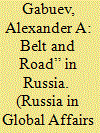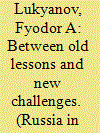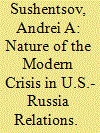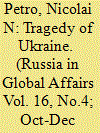| Srl | Item |
| 1 |
ID:
164264


|
|
|
| 2 |
ID:
164262


|
|
|
|
|
| Summary/Abstract |
Conceived in the fall of 2013, China’s “Belt and Road” initiative in the follow-ing five years became one of the most discussed issues among Russian inter-national relations experts. The discussions produced a plethora of academic, expert and op-ed articles designed to explain to society and the political elite what the “Belt and Road” initiative actually was and what we should do with it. Albeit differing methodologically, stylistically and ideologically, the articles on the whole testify to the existence of certain political discourse specific to Russia
|
|
|
|
|
|
|
|
|
|
|
|
|
|
|
|
| 3 |
ID:
164252


|
|
|
| 4 |
ID:
164255


|
|
|
|
|
| Summary/Abstract |
The article expounds the conceptual content of “civilizational realism” as part of the international relations theory that could help bridge the painful gap between science and practice increasingly manifest in the West, yet even more so in Russia. The ideas of “civilizational realism” are compared with similar views of leading U.S. political experts who brood over the present world order and Russia’s place in it. Some suggest resolving existing contradictions between Russia and the West by reaching an agreement with the “civilizational leaders” of the Euro-Atlantic region to create a demilitarized buffer zone made up of limitrophe Eastern European states
|
|
|
|
|
|
|
|
|
|
|
|
|
|
|
|
| 5 |
ID:
164261


|
|
|
|
|
| Summary/Abstract |
The current state of U.S.-Russia relations is often compared with that of the Cold War. However, contradictions today between Moscow and Washington do not determine the dynamics of modern international relations. The confronta-tion between these two countries embraces all spheres (informational, eco-nomic, and political), resulting in a highly-dependent situation where conflict impacts all areas of cooperation. Relations between Russia and the United States сlearly manifest a psychological phenomenon known as fundamental attribution error that indicates a tendency towards explaining the behavior and actions of other people by their bad qualities and one’s own behavior by exter-nal circumstances. At the same time, the U.S-Russia confrontation is taking place against the background of a de facto political “civil war” within the Ameri-can establishment, which has greatly disrupted foreign policy decision-making in Washington.
|
|
|
|
|
|
|
|
|
|
|
|
|
|
|
|
| 6 |
ID:
164254


|
|
|
|
|
| Summary/Abstract |
his article studies the European identity of modern Russia and EU countries. The main idea of the article is that the existence of the European Union today is largely determined by the spirit of “Europeanness” and by relations between European countries and the EU. The article examines the correlation between the notions of ‘Europe’ and the ‘European Union,’ and analyzes the results of the opinion polls conducted to measure peoples’ feeling of “Europeanness” in EU countries and Russia. Over the past twenty-five years, the EU and Russia have seen all kinds of relations—from official assurances of sharing common values, goals and interests and public support for the idea of Russia’s integration with the EU to openly competitive and, later, hostile relations. The Ukraine crisis has brought growing differences to a head, and subsequent mutual sanctions have clearly demarcated the boundaries of “Europeanness” and prospects for rapprochement or estrangement between the former strategic partners.
|
|
|
|
|
|
|
|
|
|
|
|
|
|
|
|
| 7 |
ID:
164259


|
|
|
|
|
| Summary/Abstract |
The article aims to develop an analytical model for foreign policy experts in order to gain a better understanding of Russian-U.S. relations. The content of Russian-U.S. relations is categorized into practical and ideational agendas. This article argues that the dynamics of interaction between these two coexisting agendas is crucial for understanding the dynamics of Russian-U.S. relations. Descriptive analysis is used to study, categorize, and explain such dynamics. The paper also includes an analysis of the correlation between the practical and ideational agendas. The proposed approach helps to better understand how the unique conceptual landscape of Russian-U.S. relations influences their practical domain. This approach can be used as a separate explanatory model or in combination with explanatory models of major theories
|
|
|
|
|
|
|
|
|
|
|
|
|
|
|
|
| 8 |
ID:
164260


|
|
|
| 9 |
ID:
164257


|
|
|
|
|
| Summary/Abstract |
This article examines the behavior of Poland on the international stage, specifically its interaction with the European Union, the United States, and Russia in a historical context using a psychoanalytic approach to memory studies. The author presumes that Polish foreign policy may be dominated by “strategic thanatos”—a historical practice of tactically meaningful but strategically destructive behavior which, while declaring the state’s sovereignty a supreme value, in the long run reduces the level of national security and increases international political tensions around Poland. The author suggests that Poland’s policy of building “privileged” relations with the United States and its activity in the post-Soviet space is a continuation of Poland’s interwar policy, whose historical implications have not been critically reconsidered by Polish political and intellectual elites. This policy has resulted in an objective deterioration of the strategic position of modern Poland. The author predicts that, amid a growing conflict with the European Commission, the ruling anti-liberal national clericals from the Law and Justice party will try to rely on U.S. support and become a center of gravity for European rightwing populists. The proposals of French President Emmanuel Macron to deepen European integration and build a new European security architecture together with Russia suggest that the European establishment is seeking to reduce the EU’s military
|
|
|
|
|
|
|
|
|
|
|
|
|
|
|
|
| 10 |
ID:
164256


|
|
|
|
|
| Summary/Abstract |
As the war in Ukraine enters its fifth year, it remains mired in debt, corruption, and strife. The country seems to be caught up, again, in a vicious cycle that has been repeating itself for decades, if not centuries. Classical Greek tragedy gives us a deeper look at the reasons behind Ukraine’s persistent failure to achieve social stability, and to suggest remedies. The tragic cycle can be broken through a compromise in which individual, social and divine aspirations for jus-tice are reconciled. As long as Ukrainian leaders seek to achieve justice without compromise, the nation’s self-destructive cycle is likely to persist.
|
|
|
|
|
|
|
|
|
|
|
|
|
|
|
|
| 11 |
ID:
164263


|
|
|
|
|
| Summary/Abstract |
The Indo-Pacific region is becoming the locus of growing U.S. and Chinese competition to shape the 21st century regional and global system. While a trendy buzzword, the Indo-Pacific concept is not really new, but rather an extension of the longstanding U.S. Asia-Pacific strategy to reflect two new realities: India’s becoming a more substantial economic and strategic actor in the Asia-Pacific; and the rapid ascension of China as an economic and military peer competitor of the U.S.
|
|
|
|
|
|
|
|
|
|
|
|
|
|
|
|